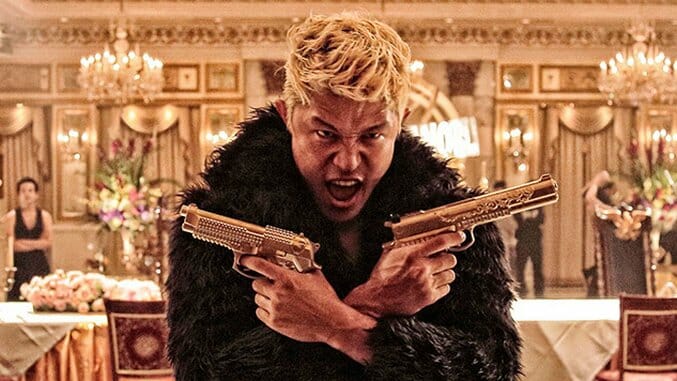Tokyo Tribe

Masquerading as a hip-hop martial arts musical, Tokyo Tribe is mostly just a puerile male fantasy come to hypercolor life. A conceit that seems like it would be pretty awesome—equal parts Wu-Tang Clan and Seijun Suzuki—it takes about five minutes to get suffocatingly old, which leaves about ten more minutes to sit through just to get all the exposition and introductions out of the way. Director Sion Sono—known for testing the limits of obnoxious filmmaking fury with a restless style perhaps best used in last year’s meta Why Don’t You Play In Hell?—is game for whatever, and from the jump he proves it: Welcome to the shithole of Tokyo, he screams via a near-six-minute single take, reminiscent, unfortunately, of Touch of Evil, replete with the swooning crane shots and the pick-your-pleasure eye candy of a Where’s Waldo fold-out. We cartwheel, double back, tilt and spiral into madness with Sono’s camera; as a simple display of virtuosity, the first shot might leave a few viewers breathless. Prepare yourself for like five more.
Sono blows his load within these first six minutes. And all gross sexual punning is intended, because during said minutes, the director not only casts inner-city Tokyo in the pall of a post-earthquake vision of a misogynist dystopia—narrated by one of the most insufferable rappers on the face of the planet (Shôta Sometani, not an actual MC)—he demonstrates the futility of the Tokyo Police Department by having an attractive police officer (who, of course, is not wearing a bra in a rain storm, and is dressed in a short leather skirt) attempt to arrest the nefarious Mera (Ryôhei Suzuki), but instead is nearly raped in front of a slavering crowd, her stomach and chest used as an ersatz map of Tokyo to then introduce the many “tribes” scattered throughout the city. It’s a hard scene to describe because it’s so stupid: The woman is apparently an idealistic rookie cop who dresses like an expensive call girl, sexually assaulted for expositional purposes, an act which also doubles as a metaphor for the extreme lawlessness of Tokyo. This whole ordeal is shot in a kind of thrilling one-take smorgasbord of technical bravura and visual storytelling; the fate of this woman is never revealed.
So let’s take stock of where we’re at: After only 15 minutes into Tokyo Tribe, we’ve endured the fact that Sion Sono is so tone-deaf he mistakes shamelessness for ambition, and we’ve been introduced to every gang in the city care of a bunch of really excruciating hip-hop. Much of Tokyo Tribe is told in rhymes, each gang assigned a particular style or sub-genre, as if the whole film takes place within a cipher from which the characters must battle their way to the top. It’s a fascinating idea until the music actually emanates from whatever source of sound one is using to watch this movie, because every single “song” here is just barely listenable tripe. The cuts run the gamut, from backpacker idealism to trap music hedonism, but none of it ever sticks. No indelible hooks, no clever wordplay—lyrics exist only to ping familiar rap tropes and provide plot points. If the phrase “Tokyo Tribes, never say die” gets stuck in your brain, that is only because it is uttered ad nauseam.